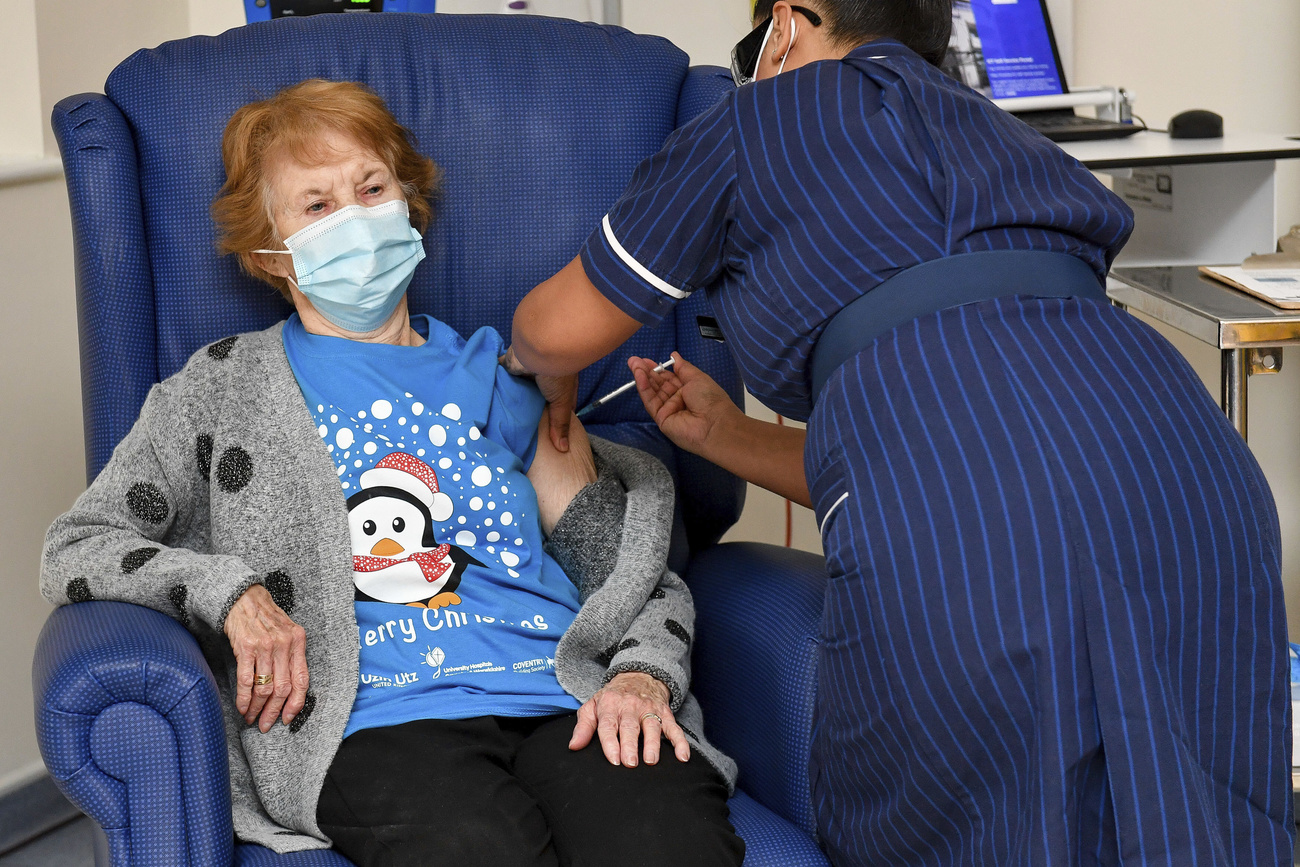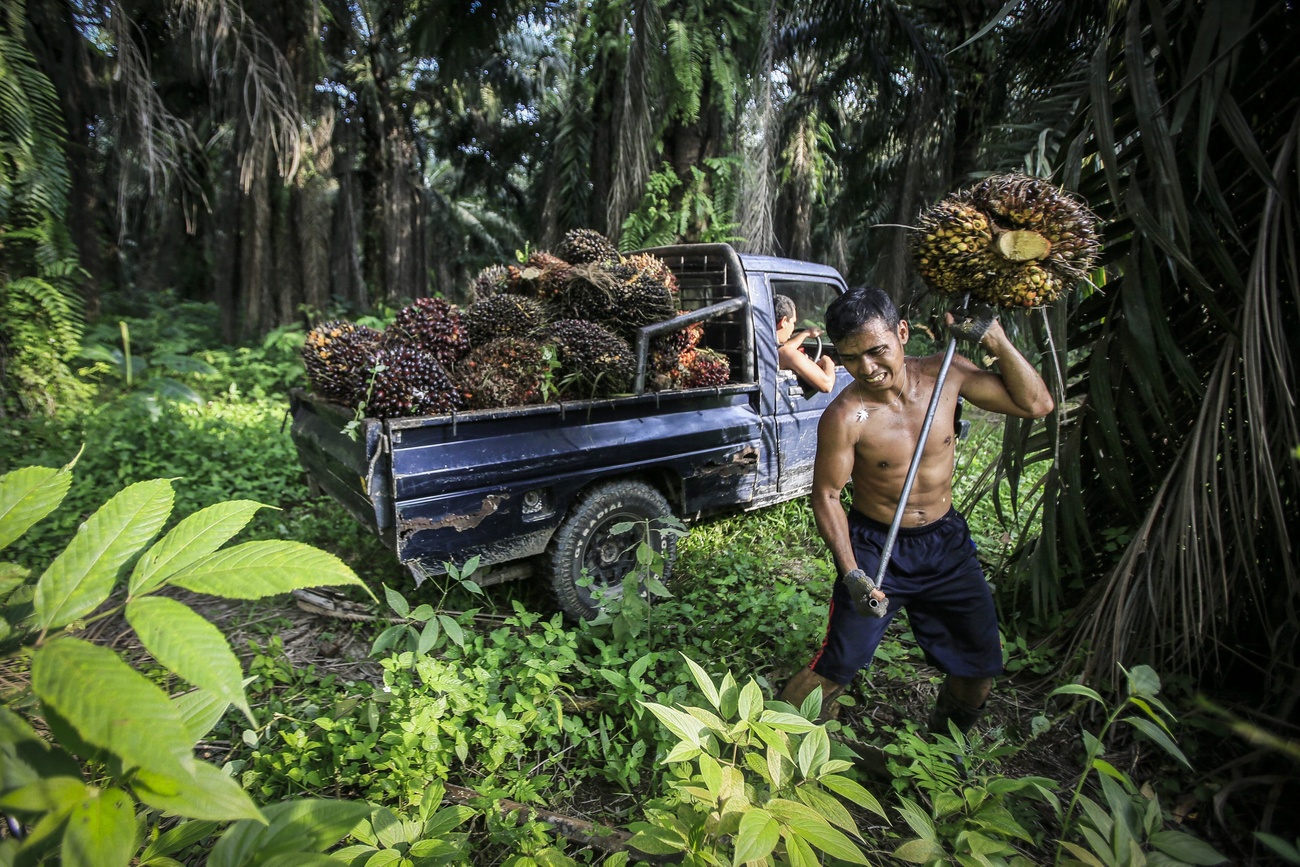
Which Swiss companies made headlines in 2020?
Here’s a clue: coronavirus. It’s no surprise that most of the Swiss companies in the news in 2020 had some connection with the biggest story of the year – the pandemic.
For a few weeks in 2020 it was possible to make it through a day without mention of Covid-19. That was back in late January when thousands of people gathered (without masks) in Davos to talk about a better kind of capitalism at the World Economic Forum annual meeting and we wrote stories about how Swiss companies were bracing for this strange new virus spreading in China.
The idea that this virus could disrupt our life here in Switzerland seemed far off. This changed on March 17 when the Swiss government shut down public life as the virus swept across Europe’s borders.
There are no winners in this pandemic but there are companies that have been riding its wave, and others that have drowned in its wake. As the year comes to a close, here’s a look at which Swiss companies caught the attention of swissinfo.ch readers across our ten languages.

More
Covid-19 vaccine: Why we still have a long wait ahead
1. With no prospects for profits, big pharma neglects new infectious diseases – One of the most read articles across languages, the story revealed how big pharma’s decision to shun infectious diseases in favour of more lucrative areas left gaping holes in the fight against epidemics like the one caused by the novel coronavirus.
Since that time, companies have been desperately trying to play catch up. Roche found a niche in Covid-19 testing but Novartis’ high hopes for hydroxychloroquine were dashed. Whether the pandemic will be a real wake-up call for the industry is still to be seen.
2. Responsible business initiative rejected at the ballot box – Ten years in the making, it’s no surprise that the November 29 vote attracted a lot of attention far beyond Swiss borders. The German version was the most read multinationals story in the language. In the lead-up to the vote, readers wanted to know why companies fear the initiative, why there are so many multinationals in risky sectors in Switzerland, and how the initiative compares with laws in other countries.

More
Fight over rights to Covid-19 drugs puts Switzerland in a tough spot
3. Why Switzerland’s Moderna Covid-19 vaccine deal is risky – It is not exactly a Swiss company, but the Boston-based biotech Moderna announced it was setting up an office in Basel just around the time it signed a vaccine deal with the Swiss government. Moderna also thrust Swiss chemical firm Lonza into the spotlight after it agreed a deal to scale up vaccine manufacturing. The story was also one of the most read in Spanish, Portuguese and Japanese.
I wrote that the deal was risky because it called into question Switzerland’s commitment to a fair distribution of vaccines. What’s changed? Here’s our latest story on how the scramble for vaccines is leaving millions of people behind.
4. Is Venezuela’s gold a liability for Switzerland? – Amid the pandemic, tensions rose over how to stamp out illegally mined gold that makes its way to Switzerland, which is home to many big gold refineries. The Venezuela story was the most read in Spanish along with stories about how the pandemic is driving more illegal mining in Peru and a rare interview with refiner PX Precinox CEO Philippe Chave.
In August, pressure mounted on Swiss refinery Valcambi over gold purchased from Dubai traders. The company continues to deny sourcing “dirty” gold and is now taking action against the NGO that brought the allegations. To be continued in 2021.

More
‘In Indonesia palm oil is bigger than watchmaking is for Switzerland’
5. ‘In Indonesia palm oil is bigger than watchmaking is for Switzerland’ – In June, my colleague Anand Chandrasekhar talked to Indonesia’s ambassador to Switzerland about a referendum launched against a free trade deal that critics argue undermines efforts to stop environmental devastation caused by palm oil. The referendum is expected to come to a vote in March 2021.
6. Nestlé struggles to win over baby formula critics – One of the most read in Arabic, Russian and Japanese, this looked into Nestlé’s plans to diversify its formula milk offerings to fill nutritional gaps, particularly in older infants. Critics say the new products are simply a marketing ploy.
7. Colonialism: How Swiss multinationals set their sights on the world – Beyond the pandemic, 2020 was also defined by a reckoning on racism and colonial ties. My colleague Andrea Tognina looked at how Swiss multinationals benefited from colonialism even if the country wasn’t technically a colonial power. A few months ago, researchers discovered that the city of Zurich profited from the slave trade, particularly in the 18th century.

More
High gold prices spur more illegal mining in Peru
8. Why Nestlé’s millions to protect an African forest could backfire – Chocolate makers found themselves on the defensive over cocoa sourcing from West Africa in 2020. Companies like Nestlé and Barry Callebaut have made lofty commitments and invested millions to end deforestation and child labour but progress has been slow. One major study found that the situation for children in cocoa areas has even worsened over the last decade.
9. Pandemic rattles already vulnerable antibiotics market – As we battle the coronavirus, another pandemic is looming that has received little attention. Most of the big pharma companies have moved out of novel antibiotic development because it isn’t profitable. In July, a coalition of big companies created a $1 billion fund for antibiotics but some say it is just a band-aid and doesn’t address underlying problems in the antibiotics market.
10. Can commodity traders get a grip on their soy supply chains? – The answer: it’s complicated. Big commodity traders like Glencore and Bunge are trying to trace their soy purchases in the Cerrado to avoid deforestation. But as my colleague writes, the incentives for farmers to produce sustainable soy just aren’t there.
There were a few honourable mentions.
- In Arabic, the most read story by far was one about Swiss parents suing French drugmaker Sanofi for failing to warn them about risks of taking its drug Depakine during pregnancy.
- In both Chinese and Spanish, the news that Novartis settled bribery suits in the US also created a stir.
- Our Portuguese readers followed news about pesticides, including an investigation into Swiss agribusiness Syngenta export of banned pesticides to Brazil.
- And lastly, in Russian, watchmaking, specifically a story about Tudor, was the most read article by far.
Are there any stories you think we missed? Are there any stories we should have our eye on in 2021? Send me a message: jessica.davis@swissinfo.ch
Thanks for reading and wishing you a safe and happy holidays.

In compliance with the JTI standards
More: SWI swissinfo.ch certified by the Journalism Trust Initiative





























You can find an overview of ongoing debates with our journalists here . Please join us!
If you want to start a conversation about a topic raised in this article or want to report factual errors, email us at english@swissinfo.ch.